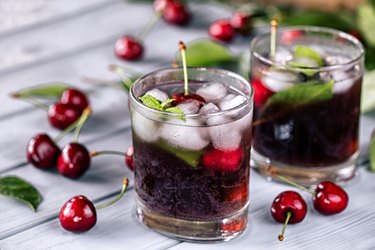
Tart cherries are quite the nutritional powerhouse, boasting a myriad of impressive health benefits that include boosting heart health to helping treat insomnia. But that doesn't mean you should sip with abandon. Drinking too much tart cherry juice can lead to some very unpleasant side effects — which, luckily — can be avoided!
Read more: Top 10 Healthiest Fruits and Vegetables
Video of the Day
Video of the Day
Before delving into the negative side effects associated with drinking too much tart cherry juice, it's worth noting that tart cherries are full of antioxidants responsible for anti-inflammatory benefits, according to a January 2019 study published in the journal Nutrients.
So even with the potential side effects, tart cherries or tart cherry juice may still be less dangerous than over-the-counter medications typically used to relieve inflammation. This is because long-term use of anti-inflammatory medications such as ibuprofen have been linked to kidney failure, heart and stomach problems, according to Oregon Health & Science University.
That would make tart cherry juice a potentially better option to control inflammation, but the juice is not without drawbacks. Read on to find out why.
Side Effects of Drinking Too Much Tart Cherry Juice
Gastrointestinal Issues
Do cherries cause gas? Unfortunately, if you eat too much, they can. This is true for tart cherry juice, too.
Potential side-effects of tart cherry juice may include abdominal discomfort and diarrhea, thanks to its high sorbitol content. Sorbitol is a natural sugar alcohol found in certain fruits and plants (such as prunes), and ingesting too much can have a strong laxative effect, according to an October 2016 study published in the International Journal of Dentistry.
"These gastrointestinal issues are especially problematic for people with conditions like irritable bowel syndrome (IBS) or Crohn's disease, as sorbitol may cause gas, bloating or stomach pain," Natalie Rizzo, RD, tells us.
Potential Weight Gain
Since tart cherry juice contains calories that are mainly sugar-derived, this could spell bad news for your weight. A one-cup serving of tart cherry juice contains 159 calories and 33 grams of sugar, according to the USDA.
For reference, the U.S. Dietary Guidelines recommend 1,600 to 2,400 calories per day for adult women and 2,000 to 3,000 calories per day for adult men — of course, this should be adjusted for factors such as height and physical activity levels.
"The drawback I see from drinking tart cherry juice comes from the extra calories you consume by drinking the amount needed to make a difference in the diet," says Sarah Pflugradt, RDN. "Most of the studies on tart cherry juice's health benefits have the participants drinking around 16 ounces of juice, which is two cups and roughly 318 calories," Pflugradt says, highlighting that the added calories can lead to weight gain. Indeed, adding 318 calories to your diet can tack an extra pound onto your frame in just 11 days!
The Bottom Line
You can certainly start incorporating tart cherry juice into your diet, but make sure to limit your sugar intake for the rest of the day to make up for the juice's added calories and sugar.
Plus, it's important to keep in mind that tart cherry juice isn't a cure-all. "I worry about getting too hyped up about a single food," Pflugradt tells us. "Yes, the research surrounding tart cherry juice is impressive, but it should not be an expectation for your tart cherry juice to make up the slack in a poor diet."
- Oregon Health and Science University: "Tart Cherry Juice Reduces Muscle Pain and Inflammation"
- Nutrients: "Effects of Tart Cherry Juice on Biomarkers of Inflammation and Oxidative Stress in Older Adults"
- International Journal of Dentistry: "Gastrointestinal Disturbances Associated with the Consumption of Sugar Alcohols with Special Consideration of Xylitol: Scientific Review and Instructions for Dentists and Other Health-Care Professionals"
- Cleveland Clinic: "Non-Steroidal Anti-Inflammatory Medicines (NSAIDs)"
- USDA: "Cherry Juice, Tart"
- Health.gov: "U.S. Dietary Guidelines 2015-2020"